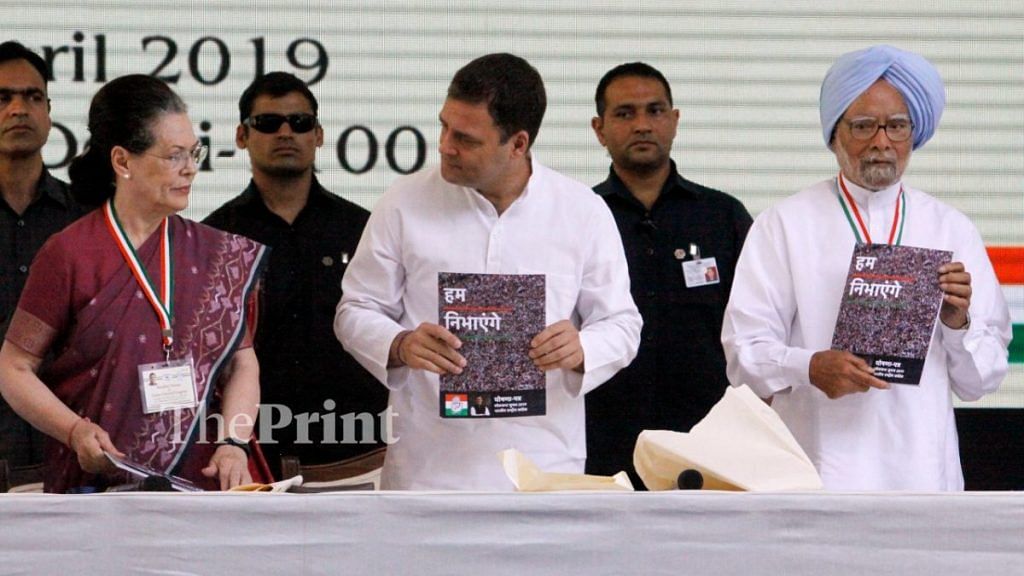New Delhi: The Congress party’s manifesto promise to review the Armed Forces Special Powers Act (AFSPA) and scrap the sedition law appear to have backfired on the party in the Lok Sabha elections.
A big indicator of this was that in many constituencies, Congress candidates lost by a very close margin as the BJP won the battle of the postal votes, which are mostly cast by defence personnel.
For example, in Haryana’s Rohtak, Congress’ Deepender Hooda lost to BJP’s Arvind Kumar Sharma by 7,503 votes. The number of postal votes received by the BJP was 7,603 out of a total of 10,897.
But Rohtak wasn’t the only such example — in Jharkhand’s Khunti, the race was even closer, with Congress’ Kali Charan Munda losing to the BJP’s Arjun Munda by just 1,445 votes. Here, the BJP received a major chunk of the postal votes with a tally of 1,072 out of a total 1,921. Kali Charan Munda has already moved the state high court to initiate a recount.
“The people were somewhat upset with the manifesto. The result shows that,” he told ThePrint.
In Karnataka’s Chamarajanagar, Congress’ R. Dhruvanarayana lost to the BJP’s V. Srinivas Prasad by just 1,817 votes. Again, the BJP bagged 1,527 of the 2,943 postal ballots, giving Prasad the edge.
Also read: BJP & Congress manifestos offer a security policy high on emotions, low on substance
Who votes via postal ballots?
Postal ballots are cast on Electronically Transmitted Postal Ballot Papers (ETPB), which are distributed to eligible voters in the Army, Navy and Air Force who are posted in various parts of the country. They are also used by the diplomatic corps posted abroad.
People on election duty, like polling agents, polling officers, presiding officers or other public servants, are also allowed to vote through postal ballots but only if they are unable to vote at the polling station where they are registered.
Then there’s the ‘notified voters’ category — which means persons who cannot cast their votes in any other manner. This list is notified by the Election Commission, in consultation with the government. While prisoners are not allowed to vote, people under preventive detention can cast their votes through postal ballots as well.
Normally, postal votes, being minuscule in number, do not matter much to the overall electoral outcome. However, they can become effective deciders, as shown by the three examples listed above.
Cumulatively, across the 542 Lok Sabha constituencies that went to the polls, the BJP garnered the highest number of postal votes.
Also read: Meet the young women and men who drafted Congress manifesto for Lok Sabha elections
Congress’ promises
The Congress’ promises came at a time when the Pulwama attack on CRPF personnel and resulting air strikes on Pakistan’s Balakot had consolidated the nationalist vote in favour of the BJP.
A senior leader who worked on the manifesto said many Congress veterans had opposed the inclusion of the promises, and expressed their resentment after being overruled.
The Congress’ manifesto team was headed by former finance minister P. Chidambaram, and many leaders have targeted him as the force behind the promises. However, Chidambaram had earlier told ThePrint that the manifesto was “discussed at length and approved” by the Congress Working Committee, the party’s top decision-making body.
The Congress in its poll pitch had promised to “Amend the Armed Forces (Special Powers) Act, 1958, in order to strike a balance between the powers of security forces and the human rights of citizens and to remove immunity for enforced disappearance, sexual violence and torture”.
The leader quoted above told ThePrint on the condition of anonymity that the phrasing of the promise was changed to make it seem less controversial. “The language was key. We promised a ‘law to balance the requirements of security and the protection of human rights’,” the leader pointed out.
The party also promised to scrap Article 124(A), the ‘sedition law’, which allows anyone who “by words, either spoken or written, or by signs, or by visible representation, or otherwise, brings or attempts to bring into hatred or contempt, or excites or attempts to excite disaffection towards the government established by law in India, shall be punished with imprisonment for life”.
“Omit Section 124A of the Indian Penal Code (that defines the offence of ‘sedition’) that has been misused and, in any event, has become redundant because of subsequent laws,” read the Congress manifesto.
Also read: Congress’ election manifesto is the right document at the wrong time: Yogendra Yadav
